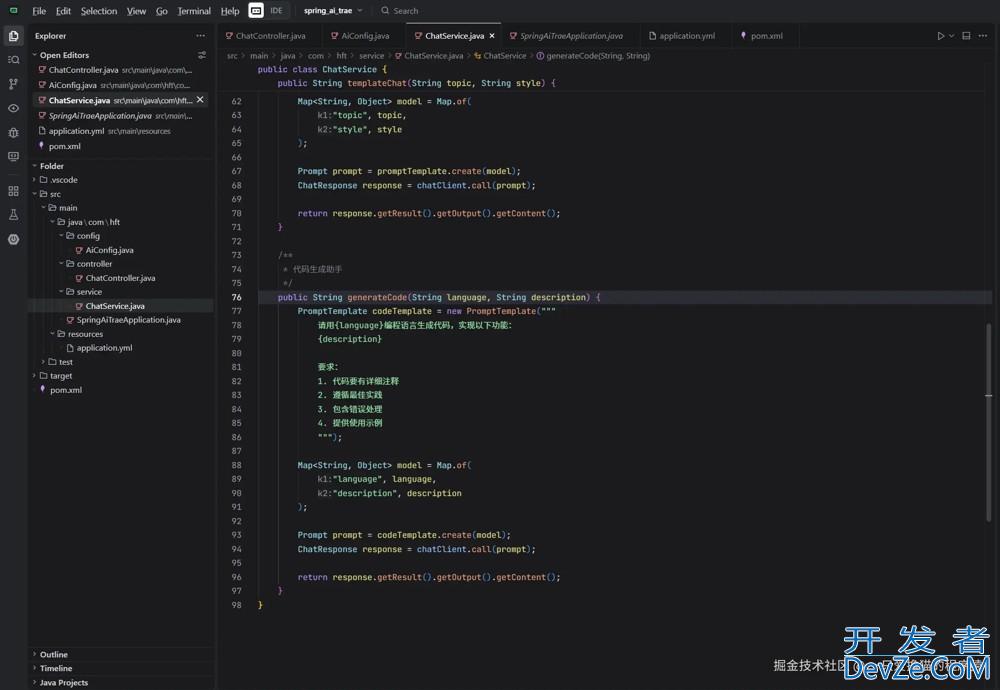在Trae IDE中创建Spring AI项目的实现步骤
目录
- Spring AI 项目完整示例
- 1. 项目结构
- 2. pom.XML 配置
- 3. 应用配置 (application.yml)
- 4. 主应用类
- 5. AI 配置类
- 6. 服务层
- 7. 控制器层
- 8. 使用示例
- 简单聊天
- 模板聊天
- 代码生成
- 9. 环境配置说明
Trae是 ByteDance 推出的 AI 驱动的集成开发环境(IDE)。Trae 是一个下一代 AI 代码编辑器,具有智能代码生成、自然语言交互、图像辅助需求表达等功能。

- 在 Trae IDE 中创建 Spring AI 项目
- 使用 Spring AI 框架创建一个 AI 应用项目
创建一个使用 Spring AI 框架创建简单 AI 应用的完整示例:
Spring AI 项目完整示例
1. 项目结构
spring-ai-demo/ ├── src/main/Java/com/example/springai/ │ ├── SpringAiDemoApplication.java │ ├── javascriptcontroller/ │ │ └── ChatController.java │ ├── service/ │ │ └── ChatService.java │ └── config/ │ └── AiConfig.java ├── src/main/resources/ │ └── application.yml └── pom.xml
2. pom.xml 配置
<?xml version="1.0" encoding="UTF-8"?>
<project xmlns="http://maven.apache.org/POM/4.0.0"
xmlns:xsi="http://www.w3.org/2001/XMLSchema-instance"
xsi:schemaLocation="http://maven.apache.org/POM/4.0.0
http://maven.apache.org/xsd/maven-4.0.0.xsd">
<modelVersion>4.0.0</modelVersion>
<parent>
<groupId>org.springframework.boot</groupId>
<artifactId>spring-boot-starter-parent</artifactId>
<version>3.2.0</version>
<relativePath/>
</parent>
<groupId>com.example</groupId>
<artifactId>spring-ai-demo</artifactId>
<version>1.0.0</version>
<name>Spring AI Demo</name>
<properties>
<java.version>17</java.version>
<spring-ai.version>0.8.1</spring-ai.version>
</properties>
<dependencies>
<!-- Spring Boot Starter Web -->
<dependency>
<groupId>org.springframework.boot</groupId>
<artifactId>spring-boot-starter-web</artifactId>
</dependency>
<!-- Spring AI OpenAI -->
<dependency>
<groupId>org.springframework.ai</groupId>
<artifactId>spring-ai-openai-spring-boot-starter</artifactId>
<version>${spring-ai.version}</version>
</dependency>
<!-- Spring AI Ollama (本地 AI 模型支持) -->
<dependency>
<groupId>org.springframework.ai</groupId>
<artifactId>spring-ai-ollama-spring-boot-starter</artifactId>
<version>${spring-ai.version}</version>
</dependency>
<!-- Spring Boot Starter Test -->
<dependency>
<groupId>org.springframework.boot</groupId>
<artifactId>spring-boot-starter-test</artifactId>
<scope>test</scope>
</dependency>
</dependencies>
<repositories>
<repository>
<id>spring-milestones</id>
<name>Spring Milestones</name>
<url>https://repo.spring.io/milestone</url>
<snapshots>
<enabled>false</enabled>
</snapshots>
</repository>
</repositories>
<build>
<plugins>
<plugin>
<groupId>org.springframework.boot</groupId>
<artifactId>spring-boot-maven-plugin</artifactId>
</plugin>
</plugins>
</build>
</project>
3. 应用配置 (application.yml)
spring:
application:
name: spring-ai-demo
ai:
openai:
api-key: ${OPENAI_API_KEY:your-openai-api-key-here}
chat:
options:
model: gpt-3.5-turbo
temperature: 0.7
max-tokens: 1000
ollama:
base-url: http://localhost:11434
chat:
options:
model: llama2
temperature: 0.7
server:
port: 8080
logging:
level:
org.springframework.ai: DEBUG
4. 主应用类
package com.example.springai;
import org.springframework.boot.SpringApplication;
import org.springframework.boot.autoconfigure.SpringBootApplication;
@SpringBootApplication
public class SpringAiDemoApplication {
public static void main(String[] args) {
SpringApplication.run(SpringAiDemoApplication.class, args);
}
}
5. AI 配置类
package com.example.springai.config;
import org.springframework.ai.chat.ChatClient;
import org.springframework.ai.chat.prompt.PromptTemplate;
import org.springframework.ai.openai.OpenAiChatClient;
import org.springframework.ai.openai.api.OpenAiApi;
import org.springframework.beans.factory.annotation.Value;
import org.springframework.context.annotation.Bean;
import org.springframework.contex编程t.annotation.Configuration;
import org.springframework.context.annotation.Primary;
@Configuration
public class AiConfig {
@Value("${spring.ai.openai.api-key}")
private String openAiApiKey;
@Bean
@Primary
public ChatClient openAiChatClient() {
var openAiApi = new OpenAiApi(openAiApiKey);
return new OpenAiChatClient(openAiApi);
}
@Bean
public PromptTemplate systemPromptTemplate() {
return new PromptTemplate("""
你是一个友善的AI助手。请用中文回答问题,并保持回答的准确性和有帮助性。
如果你不确定答案,请诚实地说明。
""");
}
}
6. 服务层
package com.example.springai.service;
import org.springframework.ai.chat.ChatClient;
import org.springframework.ai.chat.ChatResponse;
import org.springframework.ai.chat.prompt.Prompt;
import org.springframework.ai.chat.prompt.PromptTemplate;
import org.springframework.ai.chat.messages.Message;
import org.springframework.ai.chat.messages.UserMessage;
import org.springframework.ai.chat.messages.SystemMessage;
import org.springframework.stereotype.Service;
import org.springframework.beans.factory.annotation.Autowired;
import java.util.List;
import java.util.Map;
@Service
public class ChatService {
private final ChatClient chatClient;
private final PromptTemplate systemPromptTemplate;
@Autowired
public CjshatService(ChatClient chatClient, PromptTemplate systemPromptTemplate) {
this.chatClient = chatClient;
this.systemPromptTemplate = systemPromptTemplate;
}
/**
* 简单聊天
*/
public String simpleChat(String userMessage) {
UserMessage message = new UserMessage(userMessage);
ChatResponse response = chatClient.call(new Prompt(List.of(message)));
return response.getResult().getOutput().getContent();
}
/**
* 带系统提示的聊天
*/
public String chatWithSystem(String userMessage) {
SystemMessage systemMessage = new SystemMessage(systemPromptTemplate.render());
UserMessage userMsg = new UserMessage(userMessage);
List<Message> messages = List.of(systemMessage, userMsg);
ChatResponse response = chatClient.call(new Prompt(messages));
return response.getResult().getOutput().getContent();
}
/**
* 模板化聊天
*/
public String templateChat(String topic, String style) {
PromptTemplate promptTemplate = new PromptTemplate("""
请以{style}的风格,详细介绍{topic}。
要求:
1. 内容准确专业
2. 结构清晰
3. 适合初学者理解
""");
Map<String, Object> model = Map.of(
"topic", topic,
"style", style
);
Prompt prompt = promptTemplate.create(model);
ChatResponse response = chatClient.call(prompt);
return response.getResult().getOutput().getContent();
}
/**
* 代码生成助手
*/
public String generateCode(String language, String description) {
PromptTemplate codeTemplate = new PromptTemplate("""
请用{language}编程语言生成代码,实现以下功能:
{description}
要求:
1. 代码要有详细注释
2. 遵循最佳实践
3. 包含错误处理
4. 提供使用示例
""");
Map<String, Object> model = Map.of(
"language", language,
"description", description
);
Prompt prompt = codeTemplate.create(model);
ChatResponse response = chatClient.call(prompt);
return response.getResult().getOutput().getContent();
}
}
7. 控制器层
package com.example.springai.controller;
import com.example.springai.service.ChatService;
import org.springframework.beans.factory.annotation.Autowired;
import org.springframework.http.ResponseEntity;
import org.springframework.web.bind.annotation.*;
import java.util.Map;
@RestController
@RequestMapping("/api/chat")
@CrossOrigin(origins = "*")
public class ChatController {
private final ChatService chatService;
@Autowired
public ChatController(ChatService chatService) {
this.chatService = chatService;
}
/**
* 简单聊天接口
*/
@PostMapping("/simple")
public ResponseEntity<Map<String, String>> simpleChat(@RequestBody Map<String, String> request) {
try {
String userMessage = request.get("message");
if (userMessage == null || userMessage.trim().isEmpty()) {
return ResponseEntity.badRequest()
.body(Map.of("error", "消息内容不能为空"));
}
String response = chatService.simpleChat(userMessage);
return ResponseEntity.ok(Map.of(
"message", userMessage,
"response", response
));
} catch (Exception e) {
return ResponseEntity.internalServerError()
.body(Map.of("error", "处理请求时发生错误: " + e.getMessage()));
}
}
/**
* 系统提示聊天接口
*/
@PostMapping("/system")
public ResponseEntity<Map<String, String>> systemChat(@RequestBody Map<String, String> request) {
try {
String userMessage = request.get("message");
String response = chatService.chatWithSystem(userMessage);
return RphpesponseEntity.ok(Map.of(
"message", userMessage,
"response", response
));
} catch (Exception e) {
return ResponseEntity.internalServerError()
.body(Map.of("error", "处理请求时发生错误: " + e.getMessage()));
}
}
/**
* 模板聊天接口
*/
@PostMapping("/template")
public ResponseEntity<Map<String, String>> templateChat(@RequestBody Map<String, String> request) {
try {
String topic = request.get("topic");
String style = request.get("style");
if (topic == null || style == null) {
return ResponseEntity.badRequest()
.body(Map.of("error", "topic 和 style 参数不能为空"));
}
String response = chatService.templateChat(topic, style);
return ResponseEntity.ok(Map.of(
"topic", topic,
"style", style,
"response", response
));
} catch (Exception e) {
return ResponseEntity.internalServerError()
www.devze.com .body(Map.of("error", "处理请求时发生错误: " + e.getMessage()));
}
}
/**
* 代码生成接口
*/
@PostMapping("/code")
public ResponseEntity<Map<String, String>> generateCode(@RequestBody Map<String, String> request) {
try {
String language = request.get("language");
String description = request.get("description");
if (language == null || description == null) {
return ResponseEntity.badRequest()
.body(Map.of("error", "language 和 description 参数不能为空"));
}
String response = chatService.generateCode(language, description);
return ResponseEntity.ok(Map.of(
"language", language,
"description", description,
"code", response
));
} catch (Exception e) {
return ResponseEntity.internalServerError()
.body(Map.of("error", "处理请求时发生错误: " + e.getMessage()));
}
}
/**
* 健康检查
*/
@GetMapping("/health")
public ResponseEntity<Map<String, String>> health() {
return ResponseEntity.ok(Map.of(
"status", "ok",
"message", "Spring AI 服务运行正常"
));
}
}
8. 使用示例
启动应用后,您可以通过以下方式测试:
简单聊天
curl -X POST http://localhost:8080/api/chat/simple \
-H "Content-Type: application/json" \
-d '{"message": "你好,请介绍一下Spring框架"}'
模板聊天
curl -X POST http://localhost:8080/api/chat/template \
-H "Content-Type: application/json" \
-d '{"topic": "Spring Boot", "style": "通俗易懂"}'
代码生成
curl -X POST http://localhost:8080/api/chat/code \
-H "Content-Type: application/json" \
-d '{"language": "Java", "description": "实现一个简单的用户注册功能"}'
9. 环境配置说明
- OpenAI 配置:需要设置环境变量
OPENAI_API_KEY - 本地 Ollama 配置:需要先安装并运行 Ollama 服务
到此这篇关于在Trae IDE中创建Spring AI项目的实现步骤的文章就介绍到这了,更多相关Trae IDE创建Spring AI项目内容请搜索编程客栈(www.devze.com)以前的文章或继续浏览下面的相关文章希望大家以后多多支持编程客栈(www.devze.com)!





 加载中,请稍侯......
加载中,请稍侯......
精彩评论